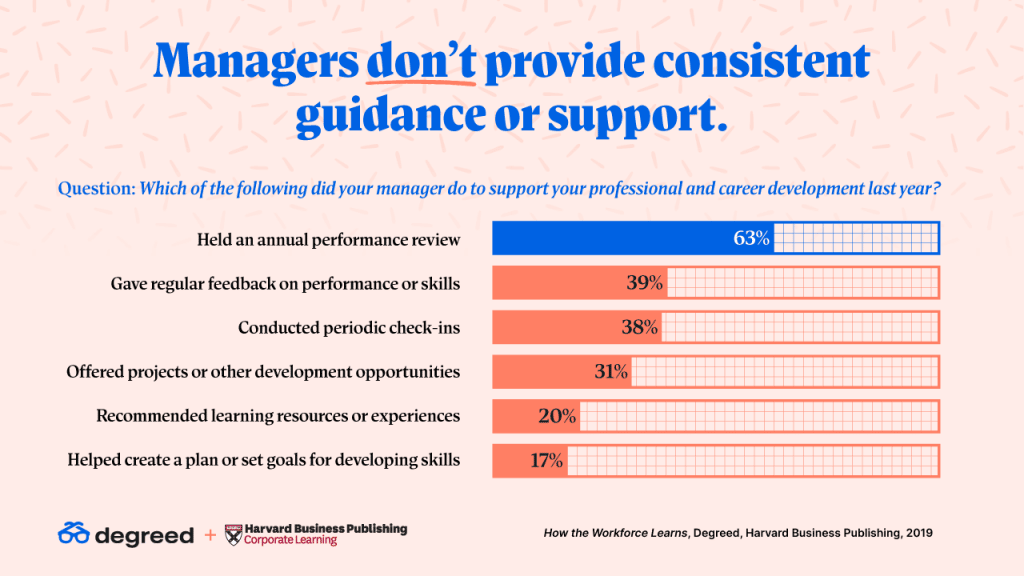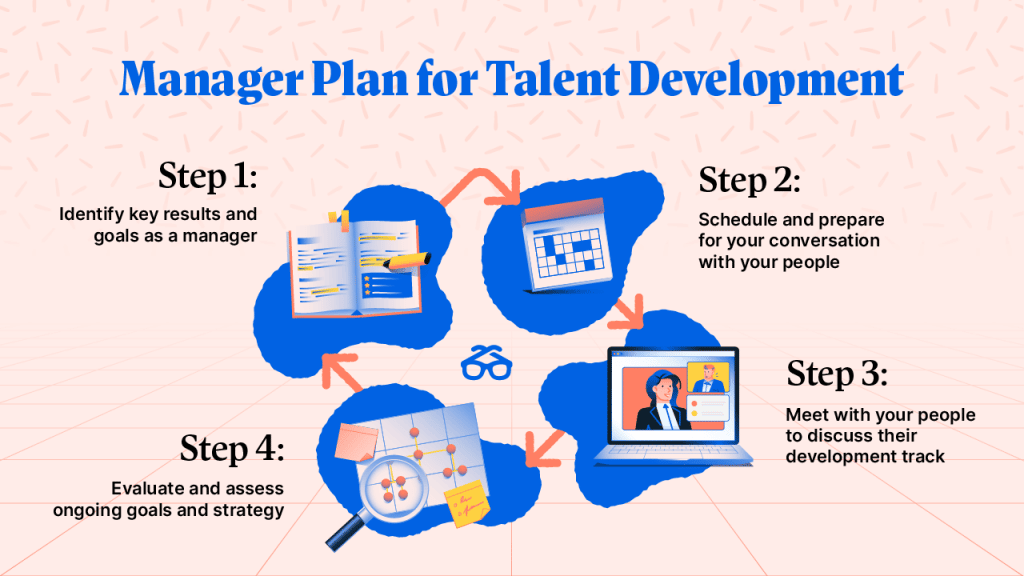Managing people can be one of the most rewarding career steps you can take. It can multiply the conversations you’re a part of, and it can elevate your impact. Why? Because you’re expected to share information with your team to drive results. When you’re a manager, you’re given more insight into company strategy and the authority to make crucial decisions that directly impact your team. In the wise words of Peter Parker, aka Spiderman, “With great power, there must also come great responsibility.” And a big part of that responsibility is building a strong talent development strategy.
The benefits of managers who support their teams’ talent development are proven. According to a 2019 Gartner study, managers can boost employee performance by up to 26% and more than triple the likelihood that workers are high performers. Despite those realities, our own How the Workforce Learns research reveals that managers do not provide consistent talent development guidance or support.

Paradoxically, achieving business results is a common reason why managers don’t develop their teams. So let’s dig into that a bit:
Losing Your Stars
Think for a moment about your star team member. You know the one. She always exceeds her goals. People consistently praise her work. And you know you can count on her in crunch time. Now imagine she leaves. How much work gets reallocated? To whom? How much extra work do you have to take on?
Employee hoarding by managers is real, even among those with the best intentions for growth and internal mobility. However unfortunate, it makes sense. When you lose resources, you have extra work on your plate along with a lengthy hiring process. Talent development within teams can seem like a disincentive.
Managers are also responsible for many business results, or key performance indicators (KPIs). And frequently, talent development strategy is not one of them.
Faced with limited time and the need to keep up with change, managers may choose to prioritize those things that will drive their stated KPIs as they coach and guide employees. To your people, that might feel disconnected from a talent development conversation. When you say, “I need you to respond more quickly to questions asked,” it sounds different than “I would like to help you improve your communication skills.” And most likely, your KPI is measured in efficiency, not skill growth.
And of course, there’s that universal constraint we all experience: time. Depending on organization norms, global teams, and the reality of shifting priorities, an hour a week with a manager may be a luxury to many people. Given that we can’t manufacture time, spending it on development and career conversations can seem daunting.
Fear Not. Stars Shine Brightly.
Let’s shed some light on solutions you can apply to the challenges. Don’t worry. Talent development strategy planning doesn’t have to be complicated. You can do this.
Imagine your superstar once again. Isn’t she great? Now imagine the team members to her left and right. What if you could make them superstars too? Better yet, what if you empower your OG Star to build coaching, leadership, and feedback skills by sharing her own knowledge and techniques to grow the functional skills of the rest of the team. That’s powerful.

How long should this take? Factor in 15 minutes for a weekly check-in and provide feedback as your people build new skills. To prepare for this, spend about 30 minutes on development strategy time (for you, the manager) to evaluate what you need to bring to the meeting.
Getting Started: Setting Goals
If there isn’t a KPI for your team’s talent development strategy, make one. And be sure to add a corresponding KPI for team members to develop themselves. One way to do this is to use Objectives and Key Results (OKRs) as a framework. Here’s what it looks like:
Objective: Coach your people to guide their own development.
Key Results:
- Conduct monthly skills and career conversations
- Update focus skills quarterly on Degreed
- Complete Self Rating on focus skills quarterly on Degreed
- Complete Skill Review on focus skills quarterly on Degreed
- [For managers] Update manager rating on role-based skills quarterly on Degreed
With this framework, there’s no need for this process to be long and intensive. Just schedule a monthly meeting with each person on your team and give yourself thirty minutes to prep and plan for the session. When you know exactly what needs to be addressed and how to measure your talent development strategy’s success, prep and meeting time are used more efficiently.
Time is Money — Spend it Wisely
It doesn’t take a lot of time to make a big impact. For instance, sharing content with a teammate or report can happen in five minutes a week. Dedicating this time every week to reach out to your team and share useful resources can make big strides in your strategy. It helps to schedule time on your calendar for a weekly reminder.
Asking how someone felt or what they learned after a big project also takes only five minutes (or a few extra if you ask a few additional questions like “What are you most proud of? What would you change for next time?” or “What skills did you build?”).
By using your time wisely, planning efficiently, setting reminders, and identifying and honing in on your superstars, you can become an active part of the talent development of your team.
Want to Learn More?
Contact us to learn more about how Degreed can help you engage employees by connecting skills to new opportunities.
And be sure to download our guide, 4 Ways Every Manager Can Create a Positive Learning Culture, to discover what managers can do to enable people like never before.

